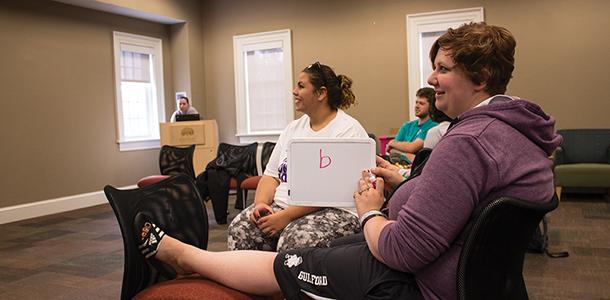Talking isn’t enough to address sexual assault
Students go over answers to another round of safe sex and healthy relationship trivia at one of the Consent Week events.
Count the of number consent t-shirts next time you take a walk around campus. They might say “Consent is Sexy” or “Netflix and chill does not equal yes.”
These shirts are just one example of how far-reaching Guilford’s movement against sexual assault and harassment. And in a country where one in every five first-year women has experienced an attempted or completed rape, these campaigns are more valuable than ever.
Fortunately, Guilford College addresses sexual assault in a range of ways. Sexual Assault Awareness Support & Advocacy is a student-run organization on campus.
“We generally try to provide a safe space for survivors to share their stories or advocate,” said sophomore and SAASA officer Eliza Stevenson. “There are no real (constraints) on who can be there, what our limits are or what events we can host.”
Additionally, Guilford recently created the position of the wellness coordinator, filled by Kristie Wyatt.
“A while ago, SAASA wrote a letter to the administration outlining problems they have seen and strategies they would recommend for improvement,” said first year and SAASA member Robert Neff-Taylor. “Kristie’s job is a direct result of that.”
However, it’s hard to gauge the true impact of SAASA and related efforts on the Guilford student body. All the classes, the fairs, the discussions — they just might not be enough.
Students enter college late in their teen years and most have already formed opinions regarding sexual violence and the opposite gender. Sometimes consent isn’t stressed enough in high school and the sudden freedom of college can lead to very dangerous situations.
While the number of sexual assault cases at Guilford have remained steady for the past few years, a recent increase in reports have caused a bit of a panic.
Does this mean the judicial process at Guilford has gotten any easier, or has the increase in awareness led to the increase of reporting?
One possible cause for the increase in cases is the gap between sexual assault and rape. The U.S. Department of Justice defined sexual assault as any form of sexual behavior or contact performed without consent. This broad definition could be stretched to include forms of harassment, such as verbal misconduct. Without strictly defining what constitutes as rape or assault, students can report many forms of harassment to the school board.
However, most rape cases go unreported. From 1995 to 2013, 80 percent of women attending college stated that they did not report sexual assault or rape. As for why, most victims believed they would receive no help or face retaliation from their abuser.
“There’s so much negative energy around the judicial process that makes people scared to report,” said Stevenson. “I’ve heard of some victim blaming coming through from the administrators of the judicial process. A lot of ‘What were you wearing?’ and ‘How much were you drinking?’ Stuff that they tell you doesn’t matter.”
If Guilford wants to encourage an honest campus, then the means of reporting sexual assault and harassment must be more compassionate to victims. Anonymous reports should not be taken lightly, and rape culture should be eradicated. Of course some people like to believe that rape culture already doesn’t exist. I guess global warming is solved and dinosaurs are still alive too.
In order to fully address the issue of sexual assault and harassment at Guilford, and at college campuses around the country, there needs to be an increase of programs like SAASA, a major overhaul to the judicial systems which deal with victims and more programs to educate students and prevent incidents.
“We … need to think about engaging in prevention early, at least at the high school level,” Kate Carey, professor of behavioral and social sciences at Brown University’s School of Public Health, told CNN. “And focus not necessarily on the women themselves, although they are a key part of the conversation, but engage all members of the community in talking about what are healthy relationships and what is the meaning of consent.”












Jeffrey Deutsch • Oct 31, 2015 at 5:33 pm
“[R]ape culture should be eradicated. Of course some people like to believe that rape culture already doesn’t exist. I guess global warming is solved and dinosaurs are still alive too.”
Way to show you haven’t got any rational arguments to support your belief in “rape culture” (whatever that means).